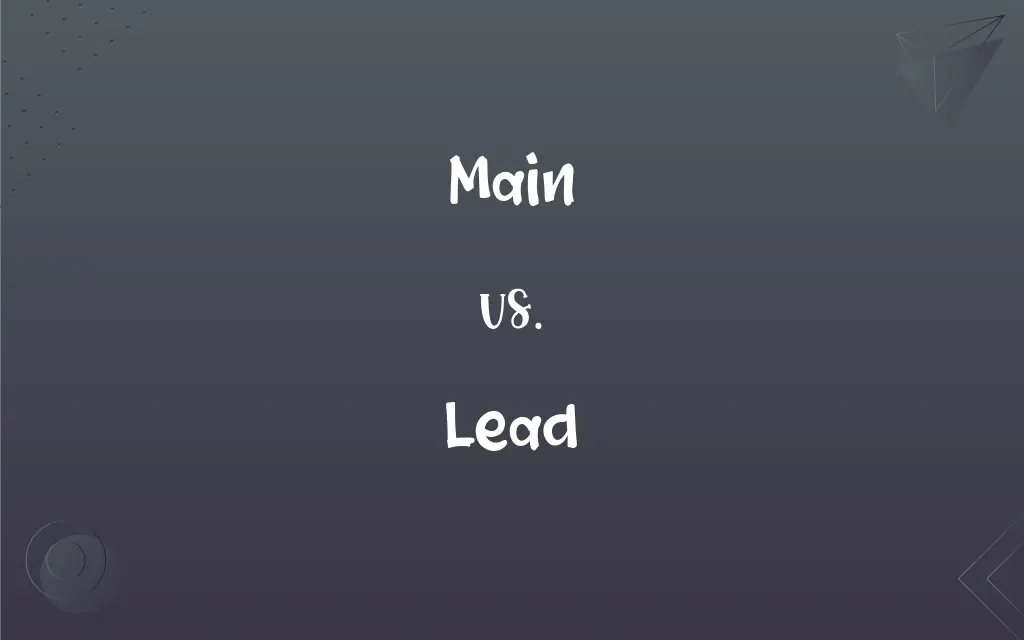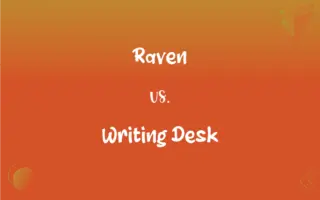Main vs. Lead: What's the Difference?
Edited by Aimie Carlson || By Harlon Moss || Published on February 18, 2024
Main refers to the most important or primary, while lead often denotes a guiding or initiating role.

Key Differences
The word main signifies the most important or central component of something. It implies primary importance or focus within a group or category. Conversely, lead often refers to a position at the front or a role that involves initiating action or guiding others. In a group setting, the main element is the central focus, while the lead is the driving force.
In terms of usage, main is typically an adjective describing the foremost part of something. For instance, the main ingredient in a dish is its most prominent component. On the other hand, lead can be a noun or verb, referring to the act of leading or the person in a guiding role. A lead actor in a play is the one who guides the narrative.
In a hierarchical context, main denotes the top level or most significant aspect, without necessarily implying leadership or guidance. For example, the main topic of a book. In contrast, lead implies an active role in guiding or influencing, such as a lead researcher in a project who steers the direction of work.
When discussing features or qualities, main emphasizes dominance or prevalence. The main characteristic of a product is its most noticeable or significant trait. In contrast, lead suggests a proactive or guiding attribute, such as a lead strategy in a business plan indicating the primary approach to be followed.
In storytelling or media, the main character or theme is the central focus around which the story revolves. The lead character, while often the main character, specifically denotes the character who drives the story forward or takes the most active role in the narrative development.
ADVERTISEMENT
Comparison Chart
Role in Context
Central or primary aspect
Guiding or initiating figure
Usage as Part of Speech
Usually an adjective
Can be a noun or verb
Implication in Hierarchy
Top level or most significant
Active role in guidance or influence
Emphasis in Features
Dominance or prevalence
Proactive or guiding attribute
Role in Storytelling
Central focus or character
Character driving the story
ADVERTISEMENT
Main and Lead Definitions
Main
Principal in role or function.
Her main focus is on environmental conservation.
Lead
To be at the front or in a guiding position.
He leads the race.
Main
Most important or central part.
The main issue was resolved first.
Lead
To guide or direct in a course.
She will lead the team in the project.
Main
Foremost in position or location.
The main entrance is on the west side of the building.
Lead
To initiate or begin a process.
Their research led to important discoveries.
Main
Chief in size or importance.
The main building stood tall among the others.
Lead
To influence or have an effect on.
His advice led me to change my mind.
Main
Dominant in extent or degree.
The main reason for the delay was bad weather.
Lead
The first or prominent position.
She had the lead role in the play.
Main
Most important; principal.
Lead
To show the way to by going in advance
The host led us to our table.
Main
Exerted to the utmost; sheer
"They took her off the sled by main strength" (Jack London).
Lead
To guide or direct in a course
Lead a horse by the halter.
FAQs
Can "main" denote the largest part of something?
Yes, "main" can indicate the largest or most significant part.
What does "main" primarily refer to in English?
"Main" refers to the most important or central aspect of something.
Is "main" used in both formal and informal contexts?
Yes, "main" is suitable for both formal and informal usage.
Does "main" have synonyms?
Yes, synonyms for "main" include primary, chief, and principal.
Is "lead" associated with a position of authority?
Yes, "lead" often implies a position of guidance or authority.
Does "lead" have different pronunciations?
Yes, "lead" as a verb is pronounced /leed/, while the noun referring to the metal is pronounced /led/.
Is "main" used in technical contexts?
Yes, "main" is often used in technical and specialized contexts.
Does "lead" imply a temporal sequence?
"Lead" can imply being first in a sequence or process.
Can "main" be used as a noun?
"Main" is typically used as an adjective but can also be a noun in specific contexts, like "main" in "water main."
Can "lead" be a noun and a verb?
Yes, "lead" can be both a noun (e.g., the lead in a pencil) and a verb (e.g., to lead a team).
Can "main" be used in the context of roads or paths?
Yes, "main" can describe the primary road or path in a network.
Can "main" relate to electrical or plumbing systems?
Yes, in contexts like main power supply or water main.
What does "lead" typically mean?
"Lead" often means to guide, direct, or be at the forefront of something.
Does "lead" have a role in journalism?
Yes, "lead" in journalism refers to the introductory section of a news story.
Can "main" refer to the most important point in an argument?
Yes, "main" can be used to signify the key point or argument.
Is "lead" used in sports terminology?
Yes, "lead" is used in sports, like taking the lead in a race.
Are there any common phrases using "main"?
Yes, phrases like "main course" or "main idea" are common.
Does "lead" have a role in music?
Yes, "lead" is used in music to denote the primary part or vocalist.
Are there idiomatic uses of "lead"?
Yes, such as "take the lead" or "lead the way."
Can "lead" be used in a passive form?
Yes, "lead" can be used in both active and passive forms.
About Author
Written by
Harlon MossHarlon is a seasoned quality moderator and accomplished content writer for Difference Wiki. An alumnus of the prestigious University of California, he earned his degree in Computer Science. Leveraging his academic background, Harlon brings a meticulous and informed perspective to his work, ensuring content accuracy and excellence.
Edited by
Aimie CarlsonAimie Carlson, holding a master's degree in English literature, is a fervent English language enthusiast. She lends her writing talents to Difference Wiki, a prominent website that specializes in comparisons, offering readers insightful analyses that both captivate and inform.































































